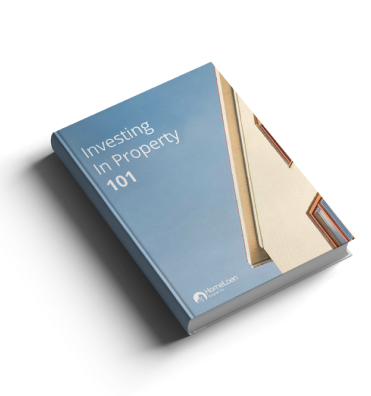An investment home loan is specifically designed for purchasing property as an investment, rather than as a primary residence. These loans are perfect for acquiring rental properties or properties with the potential for value appreciation, offering opportunities for income and profit.
When investing in property, the right loan can make all the difference. Home Loan Experts is here to guide you through the process, helping you understand the details and make informed decisions on your path to successful property investment.
What’s an Investment Loan?
An investment loan allows you to borrow money for investment purposes through financial assets like shares, managed funds, or a diversified portfolio.
Similar to a home loan, the funds you borrow are secured against the portfolio itself, giving you access to larger opportunities than if you only invested your own savings.
With an investment property loan, you can:
- Invest in both domestic and international markets.
- Take advantage of three flexible investment solutions tailored to your goals.
- Grow your portfolio with a long-term wealth-building strategy.
How Does An Investment Loan Work?
An investment loan is similar to a normal property lending. Instead of buying real estate, however, the borrowed funds are invested in listed securities and/or managed funds. Your portfolio acts as the security for the loan, while you retain the potential upside of market growth.
Benefits of an Investment Loan
- Leverage borrowed funds to expand your portfolio.
- Access global investment opportunities.
- Interest paid on an investment loan may be tax-deductible.
- Well-structured investments could generate ongoing returns or income streams.
Investment Property Loan Approval Process (Step by Step)
Here’s a quick overview of the investment home loan approval process:
- Pre-approval: Before you start property hunting, getting pre-approved for a loan is wise. Provide your financial details to a lender or mortgage broker to find out how much you can borrow. Pre-approval also strengthens your offer when buying a property.
- Documentation: Once you’ve chosen a property, gather and submit necessary documents, such as proof of identity, income and details of current debts.
- Loan application: Submit your formal loan application, including all your financial details and the property information.
- Property valuation: The lender will assess the property’s value to ensure it matches the loan amount.
- Assessment and approval: The lender reviews your application and the property valuation. If everything is in order, it will grant formal loan approval.
- Conditional approval: Sometimes, approval comes with conditions that must be met before finalising the loan. This could involve providing additional documentation.
- Loan offer: Review the loan offer carefully. It includes the loan amount, interest rate, and terms. Once you’re satisfied, accept the offer.
- Settlement: The lender transfers the funds to complete the property purchase. Finalise any legal and administrative tasks to finalise the property transfer.
Explore a detailed breakdown of each step in the loan process on our page on the Loan Application Process.
Count on us to make your loan journey worry-free, with expert help at each step. Call 1300 889 743 or get started with our free online assessment form.
Investment Loan Eligibility: Who Qualifies?
The approval criteria for investment loans is quite complicated, especially if negative gearing is involved.
Investment loans are generally a higher risk than standard home loans and, as such, you need to be in a strong financial position to qualify.
The basic lending requirements for investment home loans are:
- You should have 5%–10% in genuine savings.
- If you are borrowing more than 90%, some lenders like to see equity in other properties (if this is not your first investment property).
- A good credit history.
- An above-average credit score.
- Stable employment.
Compare Today’s Investment Loan Rates
Residentially Secured Investment Loan Rates
| Loan Category | Interest Rate | Comparison Rate | Contact Us |
|---|---|---|---|
| Variable | 5.29% | 5.30% | Apply |
| 1 year fixed | 5.29% | 5.88% | Apply |
| 2 years fixed | 4.99% | 5.80% | Apply |
| 3 years fixed | 5.09% | 7.06% | Apply |
| 5 years fixed | 5.49% | 5.55% | Apply |
Not only can you get a great interest rate, you may be able to borrow 95% of the purchase price on a residentially secured investment loan.
Commercially Secured Investment Loans
| Loan Category | Interest Rate | Contact Us |
|---|---|---|
| Variable | 5.99% | Apply |
| 1 year fixed | 5.39% | Apply |
| 2 years fixed | 5.34% | Apply |
| 3 years fixed | 5.39% | Apply |
| 5 years fixed | 5.59% | Apply |
SMSF Investment Loans
Residentially Secured SMSF Investment Loan Rates
| Loan Category | Interest Rate | Comparison Rate* | Contact Us |
|---|---|---|---|
| Variable | 6.19% | 6.79% | Apply |
| 1 year fixed | 6.34% | 6.94% | Apply |
| 2 years fixed | 6.34% | 6.94% | Apply |
| 3 years fixed | 6.34% | 6.94% | Apply |
| 5 years fixed | 6.44% | 7.04% | Apply |
Commercially Secured SMSF Investment Loans
| Loan Category | Interest Rate | Contact Us |
|---|---|---|
| Variable | 6.69% | Apply |
| 1 year fixed | 6.84% | Apply |
| 2 years fixed | 6.84% | Apply |
| 3 years fixed | 6.84% | Apply |
| 5 years fixed | 6.94% | Apply |
Please note that even if you find a great interest rate on an SMSF investment loan, most lenders will restrict your loan to 70% of the property value.
Our mortgage brokers specialise in SMSF loans and know lenders that can let you borrow up to 80% of the purchase price. You can call us on 1300 889 743 or complete our free online assessment form to check if you qualify.
Low-Doc Investment Loans
Low-Doc Investment Loan Rates
| Loan Category | Interest Rate | Comparison Rate* | Contact Us |
|---|---|---|---|
| Variable | 6.19% | 6.79% | Apply |
| 3 years fixed | 6.34% | 6.94% | Apply |
| 5 years fixed | 6.64% | 7.24% | Apply |
If you’re unable to provide normal income verification documents such as tax returns, financial statements or payslips, you can take out a low doc investment loan. However, you’ll have to pay slightly higher interest rates.
*WARNING: This comparison rate is true only for the examples given and may not include all fees and charges. Different terms, fees or other loan amounts might result in a different comparison rate. Each comparison rate is calculated based on $150,000 over 25 years for a secured loan.
Please note that you can’t get a no doc investment loan to buy residential investment properties because it would then be regulated by the National Consumer Credit Protection (NCCP) Act.
Deposit Breakdown For Investment Loans
This table provides a clear snapshot of how financial commitments vary based on different deposit amounts, helping you assess your options. For more personalised calculations, consider using an investment property calculator.
| Deposit Percentage | Property Price | Deposit Amount | Loan Amount | LMI Required? | Approximate Monthly Repayment* |
|---|---|---|---|---|---|
| 3% deposit | $500,000 | $15,000 | $485,000 | Yes | $2,908 |
| 5% deposit | $500,000 | $25,000 | $475,000 | Yes | $2,848 |
| 10% deposit | $500,000 | $50,000 | $450,000 | Yes | $2,698 |
| 15% deposit | $500,000 | $75,000 | $425,000 | Case by case | $2,548 |
Note:
Monthly repayment estimates are based on an approximate 6% interest rate for a 30-year loan. Exact amounts will vary depending on the lender, loan type, and terms.
Your Trusted Partner For Investment Loans
We specialise in securing investment property loans, even those that are hard to get approved. Our experienced brokers are dedicated to making the process smooth and stress-free, guiding you every step of the way.
Focus on your investment goals while we handle the rest. Call us at 1300 889 743.
Get Started TodayProperty Investment Guide 101
Learn the ins & outs of investing in properties, from an experienced property investor and founder of Home Loan Experts, Otto Dargan.

FAQs
How Is An Investment Loan Different Than An Owner-Occupier Home Loan?
Investment loans are for properties intended to generate income or profit. They often have higher interest rates and stricter lending criteria than owner-occupier loans.
What Are The Fees And Costs Associated With Investing In Property?
Can I Use Equity To Buy An Investment Property?
What Are The Benefits Of Owning An Investment Property?
Can I Borrow 100% For An Investment Property?
Can I Get An Investment Property Loan With Bad Credit?
Is It Possible To Refinance An Investment Property?
Tax Implications Of Owning Investment Properties
What Are the Different Types of Investment Property Loans?
How Much Can I Borrow For An Investment Property?
How do I make An Offer On An Investment Property?
What are the property Management Tips For Investors?
Still need answers? We're here to help!
Ask an expertOur team of mortgage experts will assist you within 24 hours.
